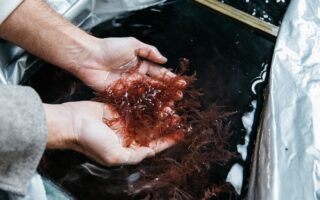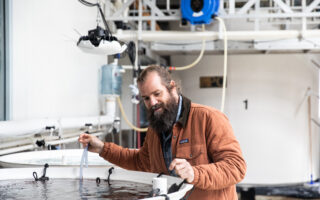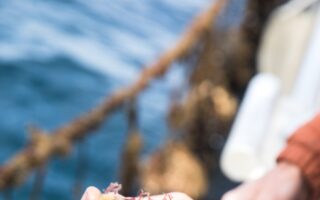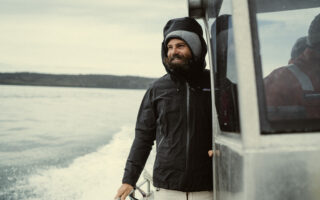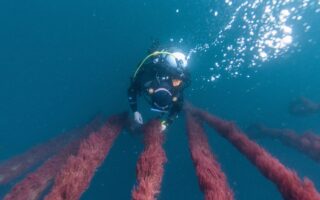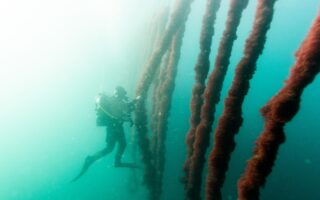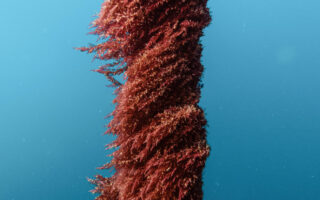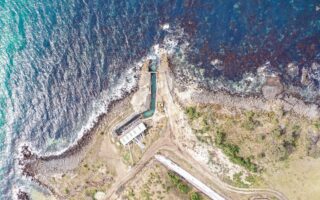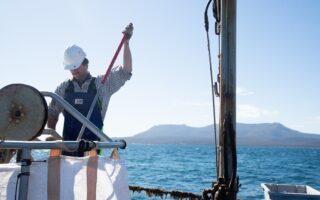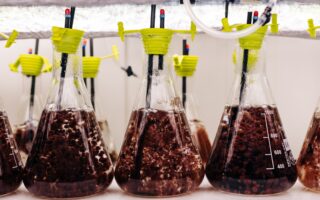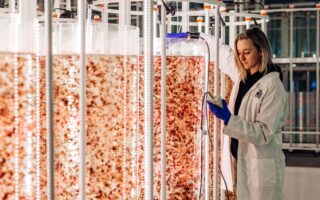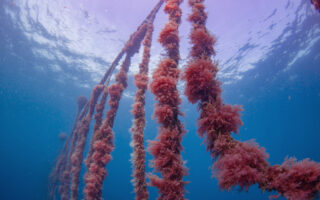Tasmanian manufacturer brings new meaning to surf and turf with methane busting livestock feed
Tasmanian manufacturer Sea Forest is ready to take the equivalent of hundreds of thousands of cars off the road and help the red meat industry meet its net zero goals through support from the Advanced Manufacturing Growth Centre (AMGC) and a unique Australian species of seaweed.
The seaweed asparagopsis armata has been known to have giant methane-busting potential when added in tiny quantities as a supplement for ruminant animals. Thanks to a collaborative project led by Sea Forest and aided by $675,000 in co-investment from AMGC, the company now boasts a state-of-the-art manufacturing facility at its Triabunna headquarters.
“This is a great Australian idea that has now been turned into a successful commercial business via manufacturing. Through the commercialisation process, Sea Forest has developed a local product with global potential, while generating jobs and supporting global moves to reduce emissions,” said Dr Jens Goennemann, Managing Director, AMGC.
The $3.2 million project took just over 18 months to complete and has created nine full-time roles and upskilled a further eight staff at Sea Forest, which has been growing seaweed at Triabunna, Tasmania since 2019. Over the coming years, the project has the potential to create over 50 new jobs in Triabunna where the company focuses its manufacturing and market development.
As a result of the project, Sea Forest has systems and practises in place for industrial-scale processing and packaging of asparagopsis extract, which is delivered to beef, milk, and wool producers in an oil-based solution.
Specifically, the extract’s compounds change the enzymatic behaviour in the final chamber of animals’ stomachs. Thereby, reducing methane emissions with just 0.2 per cent of Sea Forest’s product needed in ruminate feed to reduce emissions by up to 98 per cent. Methane is a greenhouse gas 28 times more potent than carbon dioxide, and a significant contributor to the 15 per cent of Australia’s greenhouse gas emissions that come from the agricultural sector.
Overall, Asparagopsis provides a triple benefit. It cuts digestion-related emissions from animals, grows and sequests carbon more rapidly than a land plants, and increases the rate at which livestock grow.
“AMGC has greatly assisted Sea Forest in reaching its commercial outcomes as the funding allowed us to fast track the completion of our commercial-scale processing plant which has enabled us to meet our ambitious supply targets,” explained Sam Elsom, CEO of Sea Forest.
“The process of detailing each project milestone, together with its associated budget and regular reporting has also been very helpful and ensured that project costs were largely contained, limiting the risk of budget overruns and timing delays.”
Sea Forest is one of a handful of companies using asparagopsis-related IP licenced from FutureFeed, a commercialisation company based on IP developed by CSIRO, James Cook University, and Meat and Livestock Australia.
Sea Forest aims to hit its current capacity within five years, representing 7,000 tonnes per annum of asparagopsis – enough to mitigate the equivalent of 1.2 million tonnes of CO2, equivalent to removing 300,000 cars from the world’s roads.
Sea Forest currently has a number of trials underway in Australia, The most notable with burger chain Grill’d that began offering a “Gamechanger” burger in February.* The Gamechanger pattie is made of black angus beef fed asparagopsis supplements as well as grass which reduces livestock emissions by almost 70 per cent.
The many years of Australian research into asparagopsis will be an important contributor to meeting the Australian red meat industry’s goal of carbon neutrality by 2030 (CN30.)
To learn more about Sea Forest’s project with AMGC, visit https://www.amgc.org.au/project/asparagopsis-commercialisation-project/
* https://www.grilld.com.au/gamechanger/asparagopsis-a-deep-dive

